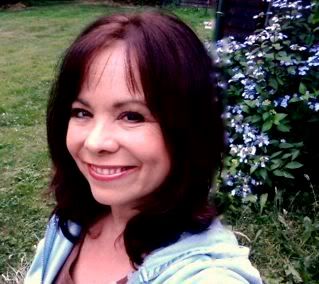
Earlier today, I said to Dave, "Check on me tonight, will you? When you get home, say, 'How's that chapter coming? Did you get it finished?' I need the accountability."
Dave gave me that look, the expression husbands the world over don whenever they find themselves being soft-spoken into a no-win situation. I saw fear in his eyes. I tried to erase it.
"I won't get snappish or crabby or defensive when you ask. I promise."
He stood there thinking, remembering. I have a feeling I've made that promise before. I have a feeling I've broken it. Without commiting to anything, he left the house--quickly, and without looking back.
When he returned awhile ago, he didn't ask. So I offered. "You know, I'm going to need a little grace on that chapter," I began.
He scoffed. Not a bad, mean, hostile scoff. Actually, it was a tad on the timid side; just enough to hint "I told you so," but undefined enough that he might be able to pretend he was only coughing, should I call him on it.
"No--I really do have a good reason," I said.
He looked at me, waiting.
"Well, first off, I was asked to do an edit. Quick turn-around. They needed the article right away . . . as in
today."
He didn't blink.
"And I spent the afternoon at the school helping with Tera's party. And after we got home, Zac needed a ride to the Y."
Nothing.
"And . . . and it took me a
loooong time to form the meatloaf into a perfect heart shape."
Know what? That one worked. He loves meatloaf, and he's not averse to heart-shaped food, if that food happens to be served on, say, Valentine's Day.
I'll put in an hour or so on that chapter after I'm finished here. Honest. You can check with me later, if you feel brave.
For now, I feel like blogging. I'm just too full not to. I've had a perfect day, and it has to come out somehow. So here goes:
--I awoke to snow on my car. Not much, but enough that the air smelled winterish and wonderful.
--My husband took me to lunch; at the conclusion, I had the most perfect puff-pastry swan filled with light-as-air cream.
--Clouds rolled in.
--Clouds rolled back out.
--I heard from an old friend.
--I heard from some new friends.
--I found what I was looking for at the library.
--My meatloaf came out perfectly; the potatoes had just enough cream cheese and butter; the peas tasted like I'd just released them from their pods.
--Zac's working on his third plateful and making appreciative, gluttonous noises, Larry's laid out like a bear skin rug near the wood stove, Tera's doing homework on the hearth, and Dave's sitting next to me on the couch,
not holding me accountable.
--There's just enough breeze that every so often, the wind chimes on the porch tinkle.
--I'm loved.
I hope you know you're loved, too, tonight. I hope your day was wonderful, and you spent time with someone you care about.
Happy Valentine's Day 
A program note: tomorrow I'm having a biopsy (nothing I'm too worried about.) If you should come to this site and see ANY posting of ANY kind, please do not read. I've never had Valium before and I'm concerned that it may cause me to write something incriminating and/or embarrassing. Your cooperation is appreciated.
Labels: Dave, home, writing

 5 Comments
5 Comments


 Four potted raspberry vines stared accusingly at me, but I managed to ignore them as I made my way to the car. I needed a break. I needed to lay off the cooking, baking, cleaning, planting and harvesting and steal a few hours of walking, shopping, talking and laughing. So no ... I didn't feel the least bit guilty as I walked past those pots. The raspberries could wait.
Four potted raspberry vines stared accusingly at me, but I managed to ignore them as I made my way to the car. I needed a break. I needed to lay off the cooking, baking, cleaning, planting and harvesting and steal a few hours of walking, shopping, talking and laughing. So no ... I didn't feel the least bit guilty as I walked past those pots. The raspberries could wait. Had we parted after that first hour, it would have been enough for me. I would have had the gulp of fresh, courage-endowing air I'd come looking for. But we didn't part. We meandered through the market comparing the bouquets of statice and just-cut lovelies that adorned about every third booth, sampling glossy Chukar Cherry chocolates, listening to the street musicians, watching the fish handlers toss salmon back and forth and enjoying their jovial bellows. We ogled at people (a market meandering must. Years ago I passed a boy on the cobblestones who was holding and eating a snake--a real, honest to goodness snake) and ogled the jeweled mounds of fruits and vegetables. My first purchase was a pound of Brussels sprouts. Don't make that face at me. You'd have bought a pound, too, if only because of the clever display.
Had we parted after that first hour, it would have been enough for me. I would have had the gulp of fresh, courage-endowing air I'd come looking for. But we didn't part. We meandered through the market comparing the bouquets of statice and just-cut lovelies that adorned about every third booth, sampling glossy Chukar Cherry chocolates, listening to the street musicians, watching the fish handlers toss salmon back and forth and enjoying their jovial bellows. We ogled at people (a market meandering must. Years ago I passed a boy on the cobblestones who was holding and eating a snake--a real, honest to goodness snake) and ogled the jeweled mounds of fruits and vegetables. My first purchase was a pound of Brussels sprouts. Don't make that face at me. You'd have bought a pound, too, if only because of the clever display.  Same-sized, bright green orbs sat in pencil-straight rows, and near the top, a green, lifelike-looking gecko sat perched and staring, with a thin slice of a Brussels sprout clenched between his teeth. A sign at his feet said, "Don't even think of disturbing this display." When I gave my order to the guy behind the counter, I admitted to a strong urge to run my hand through those green balls. The look he gave told me he thought that was really, really funny. To mend our relationships, I asked for three pounds of creamy gold Yukon potatoes, too.
Same-sized, bright green orbs sat in pencil-straight rows, and near the top, a green, lifelike-looking gecko sat perched and staring, with a thin slice of a Brussels sprout clenched between his teeth. A sign at his feet said, "Don't even think of disturbing this display." When I gave my order to the guy behind the counter, I admitted to a strong urge to run my hand through those green balls. The look he gave told me he thought that was really, really funny. To mend our relationships, I asked for three pounds of creamy gold Yukon potatoes, too. 

 In a previous post entitled
In a previous post entitled  I don't know about the rest of you, but the last words I want others to use when describing my writing are "sterile," "tiresome," and "prudent." I'd rather hear that my writing is gritty, or invigorating, or, perhaps best of all--risky.
I don't know about the rest of you, but the last words I want others to use when describing my writing are "sterile," "tiresome," and "prudent." I'd rather hear that my writing is gritty, or invigorating, or, perhaps best of all--risky.  Earlier today, I said to Dave, "Check on me tonight, will you? When you get home, say, 'How's that chapter coming? Did you get it finished?' I need the accountability."
Earlier today, I said to Dave, "Check on me tonight, will you? When you get home, say, 'How's that chapter coming? Did you get it finished?' I need the accountability."
 My friend Ken (see yesterday's post and his comment below) is an artist. I've been aware of his abilities since high school; I used to watch him hunker over a sheet of newsprint and produce uncanny likenesses of himself, or me, or any number of unknowing subjects in the halls and classrooms of Cascade High. I didn't know how he did it, but I suspected it wasn't at all hard for him. I assumed he'd reached out a tiny finger as a three-week old and been met with a touch from God, just like the reclining naked man in Michaelangelo's The Creation of Adam. My suspicion seemed confirmed after high school when he mastered "pointillism," which, loosely translated means, "the creation of dot art by one with crazy-fast wrists." My own wrists ached as I watched him slap those miniscule dots on the page. The images that emerged seemed to arise from nothing--and they were beautiful.
My friend Ken (see yesterday's post and his comment below) is an artist. I've been aware of his abilities since high school; I used to watch him hunker over a sheet of newsprint and produce uncanny likenesses of himself, or me, or any number of unknowing subjects in the halls and classrooms of Cascade High. I didn't know how he did it, but I suspected it wasn't at all hard for him. I assumed he'd reached out a tiny finger as a three-week old and been met with a touch from God, just like the reclining naked man in Michaelangelo's The Creation of Adam. My suspicion seemed confirmed after high school when he mastered "pointillism," which, loosely translated means, "the creation of dot art by one with crazy-fast wrists." My own wrists ached as I watched him slap those miniscule dots on the page. The images that emerged seemed to arise from nothing--and they were beautiful.









